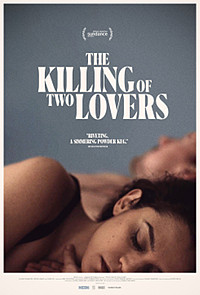| SHADOWS ON THE WALL | REVIEWS | NEWS | FESTIVAL | AWARDS | Q&A | ABOUT | TALKBACK | |||||||||||||
 Shadows off the beaten path Shadows off the beaten pathIndies, foreigns, docs and shorts...
On this page:
THE GET TOGETHER |
IN ACTION |
THE KILLING OF TWO LOVERS
| |||||||||||||
| See also: SHADOWS FILM FESTIVAL | Last update 12.May.21 | |||||||||||||
|
The Get Together Review by Rich Cline | 
| |||||||||||||
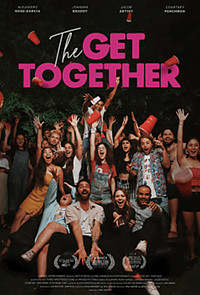 dir Will Bakke scr Will Bakke, Michael B Allen prd Jon Michael Simpson, Chad Werner, Will Bakke with Alejandro Rose-Garcia, Johanna Braddy, Jacob Artist, Courtney Parchman, Stephanie Hunt, Preston Flagg, Chad Werner, Luxy Banner, Katelyn Marie Marshall, Tiffany Skye Dodson, Ru Benjamin Revolver, Ellar Coltrane release US 14.May.21 20/US 1h14 Is it streaming? |
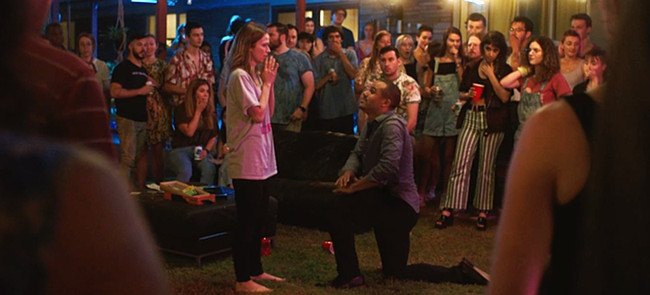 A freeform comedy about a group of interconnected people in their early 20s, this movie coasts on its energetic pace and performances rather than narrative momentum. Circling around a house party that has seemingly life-changing consequences, characters and plot points are loudly overstated, which gives the film an abrasive tone. But while the structure feels undisciplined, some engaging angles in the storylines make it worth a look. In Austin, recent university graduate August (Parchman) has been ditched by her best friend McCall (Banner) on Friday night, so she spills her guts to her nice-guy Uber passenger Caleb (Rose-Garcia). He invites her to the same cool party McCall is attending, which leads to a difficult confrontation. Meanwhile, popular girl Betsy (Braddy) turns up at the party with her new boyfriend Damien (Artist), who is trying to find the right moment to propose. But Caleb has a history with Betsy, and wants to tell her how he still feels about her. The script is a series of absurd, awkward moments loosely strung together with small catastrophes, most of which are rather obvious. Oddly, the majority of on-screen antics are flatly irrelevant to the central plot threads, padding out the already brief running time. But when director Bakke finds some focus, the superbly honest scenes reveal resonant feelings, even if most of these people are whiny, shouty idiots lost in their own misery and unable to identify with anyone else. Yes, the characters are oblivious, talking over each other until the script suddenly allows them to become human. Parchman dives into her role, playing August as a clumsy loser who tries too hard in every situation. Artist is a bit more grounded as Damien faces a series of interruptions that strain to paint him as a dork. So the characters who emerge as the most likeable, and least histrionic, are Braddy's smart Betsy and Rose-Garcia's soulful Caleb. It's their story that finally evokes sympathy and provides the smartest laughs. The film is strikingly shot Linklater-style, with snaky camerawork that prowls around between the people. When the central storyline finally emerges, the whole film settles down into a carefully constructed romantic triangle that seems predictable because of the way the writer-director Bakke and cowriter Allen have been depicting the characters from the start. And there's a nice thematic touch in the idea that we need to stop pushing people to be who we want them to be, and accept who they are.
| ||||||||||||
|
In Action Review by Rich Cline | 
| |||||||||||||
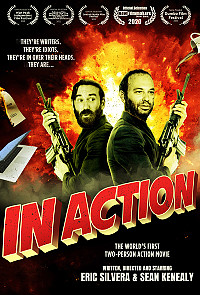 dir-scr Eric Silvera, Sean Kenealy prd Alex Nordenson with Sean Kenealy, Eric Silvera, Justin Martin, Grace Morales, Victor Silvera, Joe Ishikura, Jonathan Warren, Alyson Nawrocki, Matthew Worth, Daniel Chelemer, Johnny Sanford, Ryan Till release US 14.May.21 20/US 1h19 Is it streaming? |
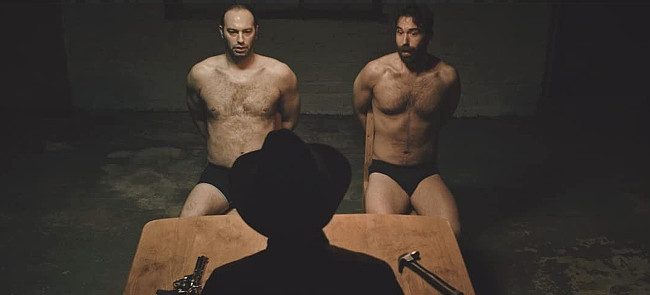 Subtitled "A Gimmick to Film a Movie Over Some Weekends With No Money", this homemade horror spoof plays imaginatively with cinematic genres in its meta-story about two writers. The narrative indulges in clever flashbacks and riotously colourful animation, while the only faces appearing on-screen are writer-directors Sean Kenealy and Eric Silvera. It's also very talky, which makes it feel like an extended stand-up double-act packed with dad jokes. When they wake up half-naked and tied to chairs, struggling screenwriters Sean and Eric have no idea how they got there. Lifelong friends who now have young families, they recall reconnecting at a wedding and then deciding to write a movie together. Eventually they come up with a blockbuster idea that centres around a terrorist attack on the wedding of the US president's daughter. After working on their first draft, they rent a hotel room together so they can tighten up the ending. And now a faceless cowboy is interrogating them about their screenplay. The fast-paced dialog is packed with witty movie references that poke fun at an industry that seems utterly unfair. Sean and Eric are chucklehead fanboys who have watched too many idiotic action movies. And they're also questioning their friendship while laying each other low with well-aimed insults. While the snappy chatter is amusing, the direction is choppy and cheesy, trying to make the most of a micro-budget. A car chase is particularly ridiculous, and deliberately so. Much of the film features Sean and Eric sitting on a sofa recounting their tale to-camera. The only contrast between them is stay-at-home dad Sean's faux prudery alongside Eric's potty-mouthed sex obsessions. Their interaction is funny and laddish, with the occasional serious moment, and both of them are easily distracted from getting down to work. The banter has a brisk and amusingly improvisational feel to it as they meander off-topic and shift locations, re-enacting various events while dropping a continual series of cinematic gags. A slight thematic kick centres around how these guys got in trouble for sending emails back and forth talking about an attack on the president. And there are more resonant edges that flare up in their ongoing conversations, discussing issues about being fathers, struggles with marriage and work, and how writing is a lot more of a discipline than it seems like it should be. Their attempts to escape their captors are knowing metaphors for working out difficult plot points. So the script is both clever and very silly. And perhaps would have worked better as a short.
| ||||||||||||
|
The Killing of Two Lovers Review by Rich Cline | 
SUNDANCE FILM FEST Is it streaming?
| 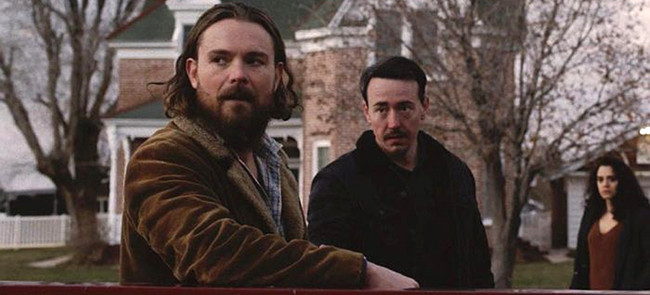 Shot in Academy ratio with a washed-out glare, accompanied by a gritty and insistent soundtrack, this film deliberately makes the viewer uncomfortable from the start. Writer-director Robert Machoian takes a somewhat indulgent earthy-indie approach that centres around moody silences. All of which makes this a film that is centred around both the acting and the technicalities of filmmaking, rather than a plot. But the situation has a strong resonance. In wintry rural Utah, David (Crawford) is struggling with the fact that his estranged wife Nikki (Moafi) has a new boyfriend, Derek (Coy), who sleeps over. David and Nikki share custody of their kids: the three lively young boys (Arri, Ezra and Jonah Graham) take things in stride, while teenage daughter Jess (Pizzuto) thinks he should be fighting harder to hold the family together. While living with his dad (Bruce Graham), David is beginning to understand that Nikki has simply given up on him. And much stronger feelings emerge when Derek stakes his claim. Oscar Ignacio Jimenez's composed cinematography matter-of-factly captures details in David's life, including family relationships and small-town camaraderie. Scenes are often filmed in long shot, placing people in wide landscapes to observe them from afar, hearing the details in their voices while watching their whole-body language. It's a little gimmicky, and it holds us at arm's length from conversations, but it looks great, and it cleverly makes us feel like voyeuristic neighbours watching through parted curtains as this family drama plays out. Crawford is excellent as a scruffy guy who adores his wife and kids, but feels he has no choice but to accept his exile. His outward expression is friendly and optimistic, trying to do what's best. Then in private he takes his pistol out for shooting practice. Supporting performances are naturalistic, bursting with a range of pungent emotions. Pizzuto has the most complex side character, a young woman who won't pretend that everything's fine. Moafi reveals telling insight into Nikki's mindset, while Coy has one particularly devastating scene. Machoian never digs into the themes that are swirling around within this story, from David's underlying feelings of damaged masculinity to Nikki's oblivious reactions to her daughter's surly rejection of the situation. Instead, the film straightforwardly depicts the various members of the family as they attempt to get on with an awkward new reality. There isn't much of a narrative, aside from the build-up in tension between David and Derek, which provides a gripping sense that something awful is coming.
| 
See also: SHADOWS FILM FESTIVAL © 2021 by Rich Cline, Shadows
on the Wall
HOME | REVIEWS | NEWS | FESTIVAL | AWARDS
| Q&A | ABOUT | TALKBACK | | ||||||||||

